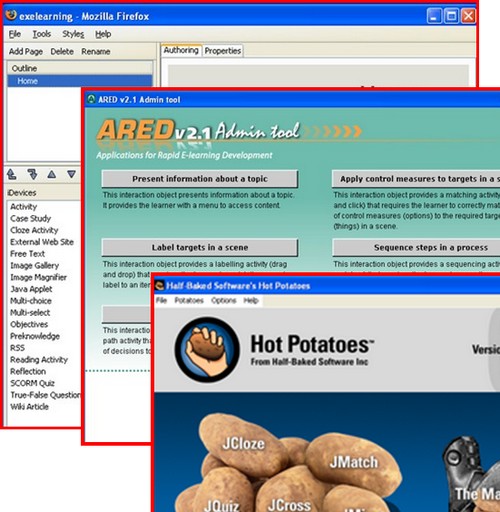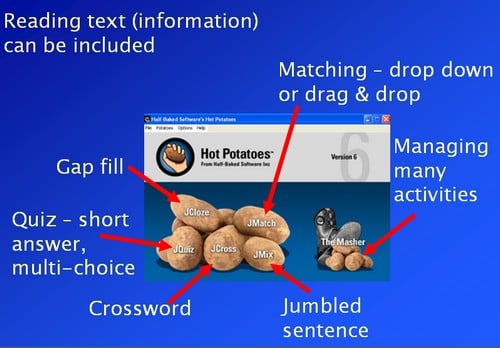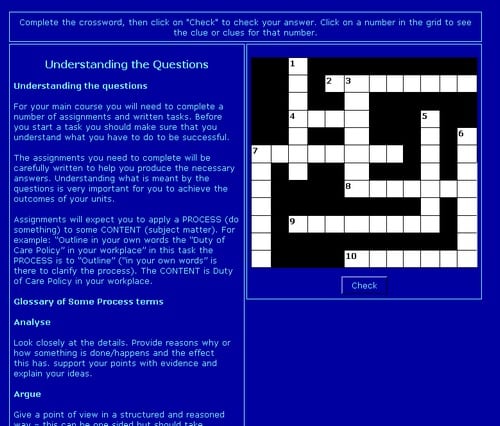Introduction
This Edublogs Fine Focus session (recording here) was a spin off from the previous week’s Serendipity session where one of our topics assessing with technology. Because all of my students are off-campus literacy students who access resources through the learning management system (LMS) I am always on the lookout for ways to include interaction in their work. Most interactive content lends itself well to a role in assessment – usually formative in my case but with the potential to be integrated into the learning management system and recorded. There are three free and easy to use applications that are my main tools and this session is an overview and comparison of some of their features.
The Session
As is usual when I present a session the first thing I did was to get some idea where everyone was “coming from” on the tools we were comparing, ARED, Hot Potatoes and eXe. This revealed that the majority were fairly unfamiliar with all three.
The three tools are all free to download.
After a brief introduction to the tools we used Application Share to take a look at some examples of the types of interaction/assessment activity that can be built with each of the tools. Throughout this main part of the session there was a lot of text chat interaction with a variety of questions about the tools.
All three of They all originated through funded projects in different parts of the world and have been around for some time. So they don’t have the latest “bells and whistles” in terms of interaction options. I use all three tools because they have different interaction types available, although this has its downside in having three different looking products and needing to remember three sets of “how to”. ARED, Hot Potatoes and eXe can all be saved in different formats including SCORM objects enabling them to be integrated into an LMS such as Moodle or Blackboard.
I personally find these three tools very useful because they are easy to use and I don’t have to worry about licensing issues if I have copies on several different computers.
Conclusion
This session was very interactive (mostly in text) despite the fact that I felt I talked too much! I’m not sure whether it is possible (in the limited time) to avoid a relatively large amount of talk from the person presenting. I do try to leaven this by using application sharing and picking up questions from text as I go, and I hope that this is reasonably effective.
Next Week
 Our next Webinar is an Edublogs “Serendipity” session, one of our fortnightly unconference sessions where we invite you to bring along your “hot topics” and “burning issues” for our poll on the topic of the day. If you want to propose a topic in advance then visit the Serendipity Wallwisher and add your topic. Then join us on Thursday Oct 28th at 23:00 GMT/UTC (7pm USA EST, Midnight BST) or Friday Oct 29th at 1am CEST,7am West Aus, 10am NSW, depending on your timezone – in the usual Elluminate room
Our next Webinar is an Edublogs “Serendipity” session, one of our fortnightly unconference sessions where we invite you to bring along your “hot topics” and “burning issues” for our poll on the topic of the day. If you want to propose a topic in advance then visit the Serendipity Wallwisher and add your topic. Then join us on Thursday Oct 28th at 23:00 GMT/UTC (7pm USA EST, Midnight BST) or Friday Oct 29th at 1am CEST,7am West Aus, 10am NSW, depending on your timezone – in the usual Elluminate room
In the Future
If you are a regular visitor to our webinars you will know that we alternate “Fine Focus” sessions on specific topics with “Serendipity” the unconference sessions where we choose a topic by poll at the start of the session. Sometimes the very fact of being asked for “hot topics” or other ideas for discussion or learning tends to make our minds blank. This has prompted me to start a Serendipity Wallwisher for topic suggestions. Please visit the wall and add your ideas for Serendipity topics so that we have more choices to consider. Some of these ideas might also form the basis for future “Fine Focus” sessions.



